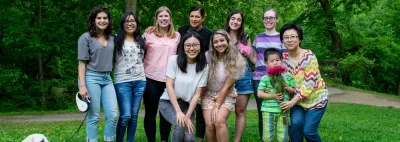

Family Involvement Laboratory (FIL)
Lab Members

Dr. Natasha Cabrera is a professor in the Department of Human Development and Quantitative Methodology, University of Maryland, College of Education. Previously, Dr. Cabrera held an expert appointment in the Demographic and Behavioral Sciences Branch of the National Institute of Child Development (NICHD). At NICHD, she was also an Executive Branch Fellow sponsored by the Society for Research in Child Development. Dr. Cabrera was intimately involved in the planning and implementation of several projects including the Science and Ecology of Early Development (SEED), the Early Head Start Research and Evaluation Project's father study, and the Early Childhood Longitudinal Study-Birth Cohort. Dr. Cabrera currently teaches graduate and undergraduate courses on social development, parenting, and child development and poverty. Her research interests include parent-child relationships, children's social and emotional development in different types of families and cultural/ethnic groups, school readiness, fatherhood, predictors of adaptive and maladaptive parenting, and translation of research into practice and policy.
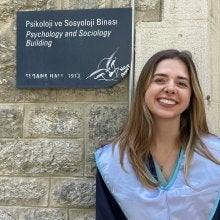
Lab Manager and third-year Ph.D. Student
Pinar is a third-year doctoral student in HDQM program at the University of Maryland, College Park. She received her B.A. in Psychology from Boğaziçi University in 2020. She continued her graduate education at Boğaziçi University under the supervision of Prof. Feyza Çorapçı in 2020. She has trained in art psychotherapy at Istanbul University, Faculty of Medicine, Department of Mental Health and Diseases, Social Psychiatry Service since 2022. Her research interest includes father-child dyad relationships and the role of fathering in children’s socioemotional development. She is also interested in using art as a way of enriching communication in the family environment.

Lab Coordinator and first-year Ph.D student
Jialing Wu is a first-year PhD student in the Human Development program at the University of Maryland. She received her Bachelor of Science in Applied Psychology from The Chinese University of Hong Kong, Shenzhen. Her research interests include the similarities and differences between maternal and paternal influences on children’s socioemotional and cognitive development, as well as how these relationships differ across cultural and socioeconomic groups.

Third-year Ph.D. Student
Miaofan Chen is a third-year Ph.D. student in the Department of Human Development and Quantitative Methodology at the University of Maryland. She holds a B.A. in Psychology and Cognitive Science from Rutgers University. Her research explores how children’s cognitive development and early learning environments shape individual differences in numerical representation. By integrating behavioral experiments, computational modeling, and neuroimaging data, she seeks to uncover the origins of number knowledge, explain disparities in number learning, and design interventions that promote equity in early math education and everyday cognition.

Lab Coordinator
Margot graduated from the University of Maryland, College Park, with a B.A. in Psychology in 2025. She leads a research project examining the mental health of parents of young children. She is an author on the Praise Project, which investigates parental feedback during math tasks and its impact on math outcomes in preschool-aged children. Additionally, she is a social media coordinator for the laboratory. Margot's professional goal is to become a Certified Marriage and Family Therapist to help clients understand the interconnected web that strings families together.

Lab Coordinator
Ria is a pre-med student at the University of Maryland, majoring in Neurobiology and Physiology and Psychology, with a strong interest in child development and maternal-fetal medicine. She is particularly drawn to topics such as playfulness and injury risk in children from low socioeconomic backgrounds, as well as the impact of socioeconomic conditions on maternal and child health. Currently, she is involved in research on parental playfulness, and also enjoys exploring parenting practices across different cultural contexts.

Lab Coordinator
Milagros has been involved in the Family Involvement Laboratory since 2021. Her journey in the lab began as a research assistant, where she was responsible for writing mathematical codes, reading and interpreting code, and data cleaning. She then became a co-leader in the Praise and Math projects, where I have been working with a wonderful team of research assistants from around the world, intending to make significant contributions to the field of development.

Research Assistant
Claire Wray earned her Bachelor of Science in Psychology from the University of Maryland, College Park and her Master’s in Social Work from the University of Maryland, Baltimore. She is a licensed clinical social worker, providing psychotherapy for young children ages birth to 12. Through practice, she’s observed the positive impact of research, discovering her interest in research projects on young children and their emotional development. Claire’s goal is to pursue a PhD and contribute to child development research. Her research interests include children’s emotional regulation, factors during infancy that lead to dysregulation issues and the impact of the parent-child relationship on children’s development, especially in minority families.

Research Assistant
Rümeysa earned both her BA and MA degrees in Psychology from Boğaziçi University in 2022. Her master's thesis explored changes and continuities in intergenerational parenting practices in Türkiye. Her research interests center on family and child well-being, the crucial role of fatherhood in child development, and supporting parenting in disadvantaged contexts.

Research Assistant
Julia is a junior at the University of Maryland, College Park, majoring in Kinesiology with a minor in Disability Studies. Julia works on the Motor Development project, which is looking to understand how infant gestures relate to language development, and the Parental Compliance project. Outside of her lab involvement, she spends her time as an anatomy teaching assistant, a Sports Medicine Intern with the University of Maryland football team, a Peer Mentor with TerpsEXCEED, the Vice President of Community Service for the Kinesiology Student Organization, and an event planner for Best Buddies. As an aspiring physical therapist, Julia is passionate about understanding movements of the human body and finding ways to improve the lives of those living with disabilities.

Research Assistant
Erandy earned her Bachelor of Science degree in Psychology from Arizona State University, with a minor in Family and Human Development. As a lifelong learner with a deep drive to conduct research, she also holds a Certification in Clinical Research Coordination. She is a research assistant with an interest in understanding children's cognitive, social, and physical development. Particularly intrigued by caregivers' involvement and how it shapes their achievements through cultural and ethnic differences in parenting behaviors. Through her experience in community health education, behavioral health, and extensive research, she can bridge the gap between knowledge and practice to support families in diverse communities, as well as fulfill her interest in higher education.

Research Assistant
Getzamary is a first-generation student in her 1st year at Centre College. She is a young Latina aspiring to practice medicine, pursuing the pre-med track as a major in Biochemistry and Molecular Biology. Specifically, she is deeply interested in forensic pathology, as it combines the processes of crime investigation and modern medicine to support societal safety. Her experience with diverse cultures, supported by her upbringing in the melting pot of Houston, Texas, motivates her to seek out experiences to continuously learn about the values and practices of people around the globe.

Suhani Shah
Research Assistant
Suhani is a junior at the University of Maryland, College Park, majoring in Human Development. She is part of the UMD Honors College, specifically the Interdisciplinary Business Honors. Suhani finds a deep interest in parent-child interactions as well as the long lasting effects of a good parent-child relationship. She is excited to work with the Family Involvement Lab as a research assistant as well as gain hands-on experience!

Pratiksha Das
Research Assistant
Pratiksha Das is a third-year undergraduate student at the University of Maryland majoring in Public Health Practice, with minors in Neuroscience and Human Development. Pratiksha is passionate about the intersection of medicine, education, and civic engagement. Her research interests include early childhood development, educational interventions for neurodivergent students, and health equity for women and children of color. Pratiksha hopes to utilize her time in FIL to learn how to integrate educational research with her future clinical practice to build a more compassionate and representative healthcare system for children.

Lily Haseltine
Research Assistant
Lily Haseltine is an Accounting and Finance Major at the University of Maryland's Smith Business School. She has been working in the Lab since Spring 2025 on Transcriptions and Motor Development. She is looking forward to contributing more to these projects this summer.

Research Assistant
Catherine Le is a junior at the University of Maryland-College Park, majoring in Cell Biology and Genetics and minoring in Human Development. She's super excited to work in the Family Involvement Lab this year! After taking a class with Dr. Cabrera, she found a deep interest in the various ways low-income minority mothers and fathers can impact children's development!
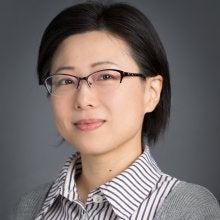
Lab Affiliate
Dr. He is an affiliate at the University of Maryland, College of Education. Broadly, her research investigates the role of motor activity in psychological processes, encompassing a wide range of psychological development, from perception and attention to cognition, speech, and socioemotional changes in diverse populations and cultural settings. A primary objective of her research, in collaboration with Dr. Natasha Cabrera and the lab, is to understand how experiential factors, such as adverse family and socioeconomic situations, and ethnic minorities, would mediate children's developmental outcomes. She received her Ph.D. in Developmental Psychology from the University of California, Berkeley. She was a recipient of the University of Maryland President’s Postdoctoral Fellowship. Currently, she is an assistant professor of psychology at Mount St. Mary's University.
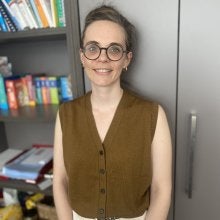
Fulbright Scholar and Lab Affiliate
Melanie is a PhD candidate in Clinical Child and Adolescent Psychology at Ruhr University Bochum. In 2024, she was awarded a Fulbright scholarship for a four-month research stay at the University of Maryland. She earned her Bachelor of Science in Psychology from Dresden University of Technology and her Master of Science in Clinical Psychology from Ruhr University Bochum. Melanie is a licensed psychotherapist in Cognitive Behavioral Therapy and is currently undergoing additional training to obtain her license in Child and Adolescent Psychotherapy. Her research interests include the transgenerational transmission of parental mental disorders, emotion regulation, and emotion socialization as mechanisms of transgenerational transmission, and caregiver–child interactions.

Dr. Jerry West
Lab Affiliate
Dr. West is an affiliate at the University of Maryland, College of Education. His research interests include school readiness, child care and early education, mothers’ and fathers’ involvement in their children’s education, and kindergarten in the U.S. He received a Ph.D. in sociology from the University of North Carolina, Chapel Hill in 1979 with a concentration in social psychology. Over his 30+ year career, he has designed and directed national cross-sectional studies of preschool, school-age children, and adults, and national longitudinal surveys of children’s development and learning from birth through middle childhood. As a Senior Fellow at Mathematica Policy Research for more than 10 years, Dr. West directed the Head Start Family and Child Experiences Survey (FACES) and other large-scale studies. Prior to joining Mathematica, he was the Director of the Early Childhood and Household Studies Program at the U.S. Department of Education’s National Center for Education Statistics (NCES).
Lab Affiliate
Dr. Uzun was born in 1978 in Ceyhan, Adana, Turkey. He completed his primary and secondary education in Ceyhan and received his undergraduate degree from Atatürk University, followed by a master’s degree from Inonu University. He earned his Ph.D. in Child Development and Education from Ankara University in February 2016. In 2021, Dr. Uzun was conferred the title of Associate Professor in the field of Child Development. His academic work primarily focuses on parent education and parent-child relationships, early childhood development, 21st-century childhood, childhood obesity, children’s rights and law, and child development- especially motor and language development. In 2024, he was invited as a visiting scholar at the University of Maryland, College Park, where he will engage in scientific research funded by a TÜBİTAK project.

Duncan Fisher
Blog Creator and Lab Affiliate
Duncan is an affiliate at the University of Maryland, College of Education. He has spent the last 23 years promoting change in policy, practice, and culture to be more supportive of fatherhood. Throughout this time, evidence from research has been his key tool. In 2014, he set up the Child & Family Blog with Michael Lamb to report on family and child development research. Fatherhood is a strong theme on the Blog. He also reports on research on fathers and maternal & newborn health: 300 research reports on FamilyIncluded.com since 2015. In the UK, he co-founded the Fatherhood Institute and helped lead the fatherhood debate in the UK. He received an OBE from the Queen in 2008 “for services to children”. Now he is working internationally to challenge the lack of attention to fatherhood in health, child, gender, and economic programmes.

Lab Affiliate
Jay Fagan, Ph.D., is Professor Emeritus in the School of Social Work at Temple University and former Co-director of the Fatherhood Research and Practice Network. His research has focused on father-child relationships and coparenting in nonresidential and low-income families; responsible fatherhood programs; coparenting interventions for low-income mothers and fathers; fathers with children in Head Start and child welfare; and adolescent fathers. Jay has published more than 100 peer-reviewed research papers, mostly on fathers. His new book, Fathers and Children Together: A Guide to Developing a Parenting Identity and Supporting your Child (2024, Routledge), co-authored with Dr. Glen Palm, is intended for an audience of fathers, mothers, and practitioners. He has also published the textbooks, New Parenting Programs for Low-income Fathers, with Dr. Jessica Pearson; Fathers and Early Childhood Programs, with Dr. Glen Palm; and Clinical and Educational Interventions with Fathers, with Dr. Alan J. Hawkins. He was the founding editor of the journal, Fathering. He taught human behavior and social environment courses at Temple University.
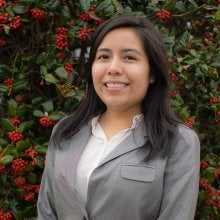
Dr. Alonso received her Ph.D in the Human Development program at the University of Maryland. She received her Bachelor of Arts in Psychology from New York University and her Master of Arts in Human Development from Teachers College, Columbia University. Through her previous work as a research assistant at NYU's Center for Research on Culture, Development, and Education and as a research coordinator at NYU Langone Health, she became interested in the role that culture plays in shaping children’s early experiences. Her research interests include how Latino immigrant parents promote their young children’s development through everyday activities, as well as how parents’ documentation status affects parent-child interactions.
Dr. Ghosh received her Ph.D in the Human Development program at the University of Maryland. She received a B.A. in Psychology from the University of Michigan, with a minor in Community Action and Social Change. Her research interests include father-child relationships and the impacts of father involvement on children’s emotional and social development throughout the lifespan. She is also interested in interventions to promote healthy development and resilience among low-income children, and public policy work pertaining to the improved support of low-income families.
Yu received her Bachelor of Arts degree in Psychology and Economics from Grinnell College and her PhD in Human Development from the University of Maryland. Before coming to UMD, Tina worked as a lab manager with Dr. Kathy Hirsh-Pasek at Temple University. Her research focuses on how parent-child interactions and home environment shape child outcomes. She is particularly interested in mothers and fathers from at-risk families and their input on and ways of interacting with their children.
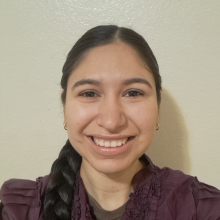
Patricia Hernandez-Beltran
Alumnus Research Assistant
Patricia became involved as a Research Assistant at the FIL during the Fall of 2024. She holds a Bachelor of Arts in Sociology from the University of California, Los Angeles. Patricia has experience serving, teaching, mentoring, and advocating for underrepresented communities and students through education and communications. She became interested in the Lab because she wanted to explore parenting with toddlers and the interactions they had together. During her time at the FIL, she has worked on coding Parent and Child interactions during toy and non-toy play for English and Spanish speaking families, and as a social media coordinator for the lab's Instagram.

Liz received her Bachelor of Science in Psychology from The College of William and Mary, her Master of Arts in Comparative Human Development from the University of Chicago, and her PhD in Human Development from the University of Maryland. Dr. Karberg is a Senior Research Scientist at Child Trends. She studies parent-child relationships in fragile families (families in which the parents are not married), and how parent involvement affects early development in these families.

Catherine is an alumnus of the Department of Human Development and Quantitative Methodology at the University of Maryland, where she also completed a Certificate in Population Studies from the Maryland Population Research Center. She received her Bachelor of Science degree in Human Development and Family Studies from Pennsylvania State University and her Master of Science in Teaching English to Speakers of Other Languages from Fordham University. Dr. Kuhns is a research associate in the Center on Labor, Human Services, and Population at the Urban Institute. Her research focuses on child welfare and public programs that support the well-being of low-income children and families. She is also interested in using research to inform policy at the local, state, and federal levels to enhance child well-being. Catherine is currently a Doris Duke Fellow.

Jenessa is an alumnus of the Family Involvement Lab. She is a Senior Social Science Research Analyst in the Administration for Children and Families’ Office of Planning, Research, and Evaluation (OPRE). Her portfolio includes research and evaluation projects related to child welfare and early care and education programs (Head Start and CCDF). Dr. Malin began her work at OPRE as a Society for Research in Child Development Executive Branch Policy Fellow. She holds a B.A. in Psychology from Duke University. She also has an M.A. in Measurement, Statistics, and Evaluation and a Ph.D. in Human Development, both from the University of Maryland, College Park.